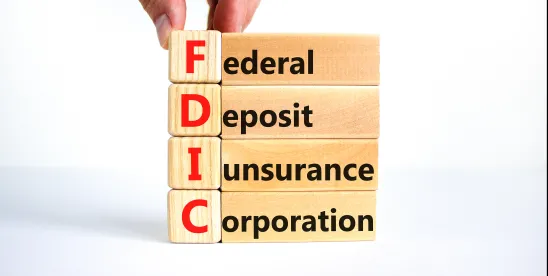The Federal Deposit Insurance Corporation (FDIC) has revised its regulations on Section 19 of the Federal Deposit Insurance Act to conform with the previously enacted Fair Hiring in Banking Act (FHBA). The FHBA paved the way for individuals convicted of certain crimes to become employed or participate in the affairs of an FDIC-covered institution without first seeking the consent of the FDIC. The new regulations clarify key Section 19 definitions and procedures related to covered offenses and the consent application process. The new regulations go into effect on Oct. 1, 2024.
Section 19
Section 19 of the Federal Deposit Insurance Act focuses on the disclosure of crimes involving dishonesty, breach of trust, or money laundering and potential employment (or request to the FDIC for consent to employ) depending on the offense.
Generally, Section 19 prohibits participation in insured depository institutions by any person who has been convicted of a crime involving dishonesty, breach of trust, or money laundering or having agreed to enter into a pretrial diversion or similar program in connection with any such offenses without the FDIC’s prior written consent.
FDIC Clarifications
Beginning Oct. 1, 2024, Section 19 will include the following categories of carve outs to its prohibition rule:
- Certain older “covered” offenses: (1) if it has been at least seven years since the offense occurred; or (2) if the individual was incarcerated with respect to the offense and it has been at least five years since the individual was released from incarceration; or (3) for individuals who committed an offense when they were 21 years of age or younger, if it has been more than three months since the sentencing occurred; and
- Offenses for which an order of expungement, sealing, or dismissal has been issued regarding the conviction; and
- Exemptions for de minimis offenses (minor offenses defined by statute) or for “designated lesser offenses” (including fake identification, shoplifting, trespass, fare evasion, driving with an expired license or tag) if at least one year has passed since the applicable conviction or program entry; and
- The FDIC codified procedures for consent applications.
The minimum 10-year prohibition rule remains for federal covered offenses identified under 12 U.S.C. § 1829(a)(2), which involve certain financial crimes.
In addition, the FDIC clarified certain provisions previously within the FHBA. For instance, the FDIC interprets the term “offense committed” and “offense occurred” to mean the “last date of the underlying misconduct.” Where multiple offenses were involved, those terms mean the last date of any of the underlying offenses.
The FDIC also interpreted the exclusion for “an offense involving the possession of controlled substances” to exclude criminal offenses involving simple possession of controlled substances and possession with intent to distribute a controlled substance. This exclusion might also apply to other drug-related offenses, depending on the circumstances, as long as they do not involve dishonesty, breach of trust, or money laundering.
Next Steps for Employers
Covered employers who are required to comply with Section 19 should make reasonable, documented inquiries to verify an individual’s conviction history to comply with the new requirements. In addition, they may consider taking steps to ensure they are making lawful inquiries to capture the FDIC’s requirements, while making prudent lawful employment decisions consistent with federal, state, and local laws.





 />i
/>i

